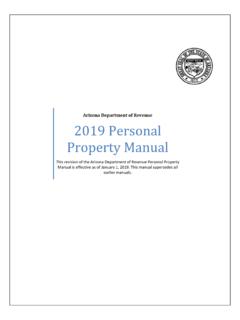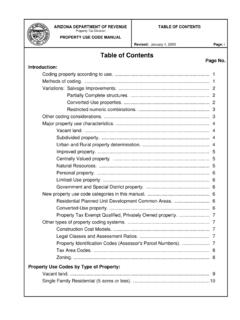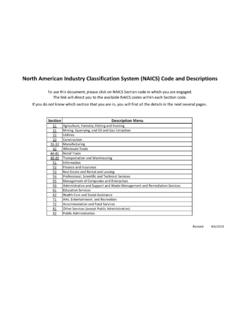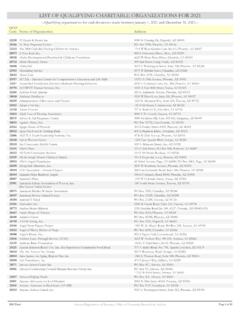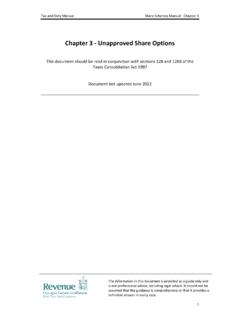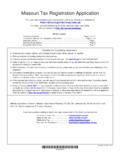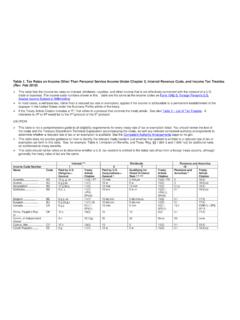Transcription of Part One Chapter 4 Property Tax Exemptions - AZDOR
1 Part One Chapter 4 Property Tax Exemptions Assessment Procedures Manual Property Tax Exemptions Arizona Department of Revenue 1 | P a g e Background All Property in Arizona is taxable unless exempted under the laws of the United States or under the provisions of the Arizona Constitution and the related Arizona Revised Statutes ( ). 42-11002. See Ariz. Const. art. IX, secs. 2, , , and ; 42-11101 through 42-11133. The information in this Chapter is based upon these constitutional and statutory provisions, which are subject to modification at any time by the courts and periodically by the legislature. Any changes in Property tax law made by the courts or the legislature will be reflected in subsequent versions of this Chapter of the ASSESSMENT PROCEDURES MANUAL. Assessor Responsibility The county assessor is responsible for locating, identifying, classifying, valuing, and listing on the tax roll all locally assessed Property that is subject to Property taxation.
2 The assessor is also responsible for processing and approving or disapproving Property tax exemption applications, monitoring previously-approved Exemptions , and discontinuing Exemptions that are no longer warranted. The Department exercises no responsibility with respect to administering Exemptions , other than prescribing various application forms that are required by statute. See exemption Applications and Affidavits, below. exemption of Government Property exemption from Property taxation is automatically granted for Property owned by government entities, which do not impose Property taxes on one another. 42-11102(A) and 42-11103(A). Accordingly, government-owned Property is not subject to any application provisions in order to obtain or maintain exempt status. 42-11102(B) and 42-11103(B). exemption of Private Property The county assessor may grant Property tax exemption for Property owned by certain private individuals and nonprofit organizations, institutions, and associations that use the Property for qualifying purposes.
3 See 42-11101 through 42-11133. The Assessment Procedures Manual Property Tax Exemptions Arizona Department of Revenue 2 | P a g e exemption of privately-owned Property may be granted only upon formal application. See 42-11151 through 42-11155. Exempt Property Included on the Tax Roll Property exempted from Property taxation must nevertheless be included on the tax roll. Pursuant to 42-15152, all real Property that is subject to the jurisdiction of this state,..regardless of whether it is exempt from taxation by law or by the Constitution of Arizona, shall be listed on the The roll shall also include the total personal Property tax roll . The specific amount of each Property tax exemption should also be included on the tax roll. Because exempt Property is not revalued on a regular basis in many instances, the Property value listed on the tax roll should consist of at least an estimated land value and the value of any improvements according to the cost approach.
4 Exempt Property values and exempted Property tax amounts are listed on the tax roll to provide budget-setting and budget-approving entities with estimates of the total value and tax that have been purposely omitted from the tax roll. Having the omitted figures allows these entities to more accurately determine appropriate tax rates, which are imposed on all taxable Property to derive the funding necessary for the operational purposes of each taxing jurisdiction. exemption Requirements exemption Application The exemption application process for individuals and organizations is described in 42-11152. In almost every case, the taxpayer must appear before, and/or file an application with, the county assessor and provide information required by the assessor to make an exemption determination. In certain cases, only an initial exemption application is required, while in other cases, an annual application is required.
5 See exemption Applications and Affidavits, below. Assessment Procedures Manual Property Tax Exemptions Arizona Department of Revenue 3 | P a g e Property Ownership and Use To qualify for most Property tax Exemptions , there are both ownership and use requirements that must be satisfied. However, some exemption statutes contain only a Property use requirement ( , Property must be used for , used in , used as ). In these instances, there is no Property ownership requirement to qualify for exemption . Many properties in this category are leased to be used for a qualifying exempt use. Nonprofit Status Many Property tax exemption statutes require that the Property is not used or held for profit in order to qualify for exemption . Both the term nonprofit and the phrase not for profit are also utilized in various Property tax exemption statutes.
6 For the purposes of administering Property tax Exemptions , nonprofit and not for profit are considered to be synonymous. If the use of a Property creates a potential for realizing a profit, or if a Property is held for future profit ( , speculation), the use is considered for-profit, and the Property does not qualify for Property tax exemption . Confirming Nonprofit Status. An entity may confirm its nonprofit status with the assessor according to 42-11154(1), which states, Nonprofit organization status may be established by a letter of determination issued in the organization s name by the United States internal revenue service recognizing the organization s tax-exempt status under section 501 of the internal revenue code . This requirement does not apply to churches, synagogues, temples, mosques, or similar organizations. 42-11154(1)(a). Internal Revenue Code.
7 Section 501(c) of the Internal Revenue Code ( ) includes many numbered paragraphs that list the organizations recognized by the Internal Revenue Service (IRS) as exempt from federal income tax. These same numbered paragraphs are often referenced in sections of the that address Property tax Exemptions . Usually, it is paragraph (3) that is specified ( , 501(c)(3)). The full text of the can be found in Title 26 of the Code. Assessment Procedures Manual Property Tax Exemptions Arizona Department of Revenue 4 | P a g e Examples of the types of nonprofit organizations listed in the include charitable, religious, educational, scientific, and literary. Under the , a qualifying charitable purpose can encompass a long list of activities, such as relief for the poor and distressed, elimination of prejudice and discrimination, or operation of labor or political societies.
8 See IRS, Charities and Nonprofits, Exempt Organization Types. It is important to note that IRS recognition of a Property owner as a charitable or nonprofit organization for income tax purposes does not alone qualify the organization for exemption from Property taxation. Nonprofit Ownership and Use of Property . The following table summarizes key Arizona court decisions regarding nonprofit ownership and use of Property and Property tax exemption . Key Court Decisions Regarding Nonprofit Ownership and Use of Property Both the use and the ownership of the Property of nonprofit organizations must be considered to determine eligibility for Property tax exemption . The fact that the constitution excludes from the exempt category any Property of charitable organizations used or held for profit creates a use requirement in addition to the ownership requirement . Kunes v.
9 Samaritan Health Service, 121 Ariz. 413, 416, 590 1359, 1362 (1979) A nonprofit owner of Property may lease a portion of its Property to a nonprofit tenant without forfeiting the tax-exempt status of the Property . The nonprofit status of, and the use of the Property by, both the owner and tenant must be considered. [ ] 42-11154 and 42-11155 specifically require us to consider the status of both owners and users of Property in evaluating whether the Property is being used or held for profit. Those statutes are inconsistent with that we must ignore [the tenant s] charitable use of the Property in determining the tax status of the portion [the tenant] leases. Volunteer Center of Southern Arizona v. Staples, 214 Ariz. 36, 39, 147 1052, 1055 (2006) The requirement that Property is not used or held for profit is not absolute. As long as the Property owner primarily uses the Property for a designated exempt purpose, the Property is entitled to exemption despite occasional or incidental use of the Property for other purposes.
10 In interpreting and applying tax exemption statutes, our supreme court and this court have consistently recognized the taxpayer may claim the exemption despite some non-exempt use as long as the taxpayer is primarily using the Property in the manner specified by the Legislature. Tucson Botanical Gardens Inc. v. Pima County, 218 Ariz. 523, 526, 189 1096, 1099 (2008) Assessment Procedures Manual Property Tax Exemptions Arizona Department of Revenue 5 | P a g e Held vs. Owned The terms held and owned (or variants thereof, such as owned by ) are often considered to be synonymous. However, this is not always the case as the terms are used in the For example, the language of 42-11155 indicates that the terms can have different meanings with regard to charitable institutions.
